Hiring crisis for disability service providers deepens

Finding staff for disability program providers was an issue prior to the pandemic and the problem has not eased. As more people want to return to in-person services, providers are struggling to fill positions and many are unable to have more people return to in-person programming.
Spring Lake Park-based Rise, with more than two dozen locations in the Twin Cities and outstate, is stepping up advertising for its openings, changing its compensation model and offering a $1,000 hiring bonus, as well as adding HR recruitment staff, explains VP of Advancement Noel McCormick, shown at left. She said wage increases will not be sustainable without more funding.
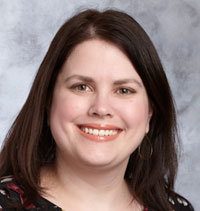 Many of its open positions, including for direct support professionals (DSPs), have far fewer applicants, some are not attracting qualified people and others are garnering no applicants at all. A number of case manager and supervisory positions which were easier to fill in the past are open now.
Many of its open positions, including for direct support professionals (DSPs), have far fewer applicants, some are not attracting qualified people and others are garnering no applicants at all. A number of case manager and supervisory positions which were easier to fill in the past are open now.
Some providers are seeking any possible solution while waiting for legislative action to make direct care wages more competitive with the overall job market, explains Linda Moore, executive director of Chrestomathy, Inc. in the Twin Cities.
The nonprofit said that while many industries face similar labor challenges and have had to become more competitive with wages, disability service providers are not able to increase their price point for services to offset increased wage expenses.
Similar story for rural provider
On the northwest side of the state, Polk County DAC in Crookston and East Grand Forks is finding the worst hiring conditions in the executive director’s 36 years of service.
A dollar per hour in wage increases over the last six months have not been enough, said Executive Director Jo Bittner, pictured at right, who plans to ask her board of directors for another increase in August. 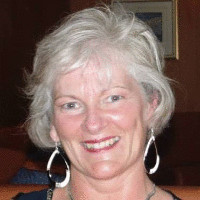
Referral bonuses of $1,000 have attracted just one new hire in recent years, though the DAC has offered them for some time. They’re paid in stages as the new staff stays on.
Bittner said a former employee accepted a job there and declined a week later. Then, two others were offered a job, one accepted and didn’t show up. It was offered to a third person, who accepted, then declined. Expecting a call back on the following Monday, Bittner heard nothing. The person wouldn’t answer her texts.
“It’s the worst it’s ever been, I must admit,” said Bittner. Crookston, with a population of about 7,800, is a very difficult place to find new employees. “We have phenomenal benefits and have protected those,” she said. Despite higher wages, and advertisements citing no weekends, holidays or evenings, Polk County DAC can't find enough staff to serve all clients who wish to return.
Numbers at the small disability service provider are down by 20 percent in East Grand Forks and are at a pre-COVID level in Crookston. The facility reopened on May 3, and group homes are appreciative. East Grand Forks serves 24 individuals with disabilities and Crookston, 47.
Wage increases needed across state
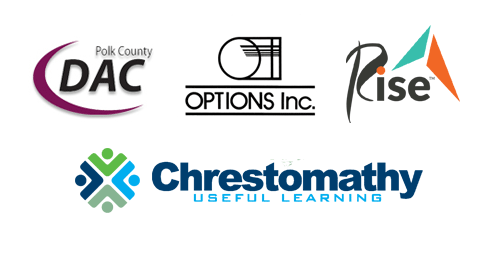 Jumping to the exurban or west of the Twin Cities area, Big Lake-based Options, Inc. has seen a decline in applications and raised its starting wage and current staff wages, said Executive Director Brenda Geldert. Employment services jobs (job development) have not seen a slowdown in applicants, but start at slightly higher rates.
Jumping to the exurban or west of the Twin Cities area, Big Lake-based Options, Inc. has seen a decline in applications and raised its starting wage and current staff wages, said Executive Director Brenda Geldert. Employment services jobs (job development) have not seen a slowdown in applicants, but start at slightly higher rates.
Providers are struggling to be as creative as possible with solutions, said Moore. "The revenues we are generating as we restart are not enough to over our expenses. We need ongoing assistance for providers to recover," she said.
Along with the frequent, no nights and weekends enticements, Rise is touting a “make a difference’ aspect to its job opportunities. It is exploring outdoor and radio advertising, as well as direct mail ads to reach people who live near Rise locations.
DSPs and drivers are needed in Anoka, Hennepin and Washington counties and at Rise’s location in New Richmond, Wis. And, employment consultants are needed in the metro and rural areas. Case manager and supervisory positions are also open.
Provider staff are conduit to healthy, fulfilled lives
“We are most concerned for the well-being of those we serve,” said McCormick. People with disabilities who do not leave their homes have difficulty working on employment and personal goals and Rise worries about the physical and mental implications brought on by that experience, she said.
Bittner said a MOHR technical assistance training advised offering “love” to staff. “It’s kind of a strange term to use in a work environment,” she said. Staff want empathy, more feel-good interactions with 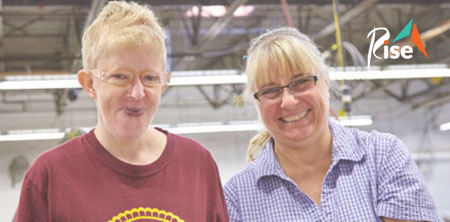 management. “I’ve done that, checking in on people who have had COVID. You try to be closer to your staff.”
management. “I’ve done that, checking in on people who have had COVID. You try to be closer to your staff.”
She is also considering a split referral bonus plan, giving $500 to the new applicant and $500 to the current employee who refers.
Moore said there are providers that have not yet regained fiscal security or stability after COVID. Some are experiencing monthly losses and concerned about long-term solvency without stable funding and staffing. DSP jobs offer many positives over other work, she said, and that message needs to spread.
“While many in the community are ‘getting back to normal,’ people with disabilities are in danger of being left behind,” said McCormick.
With nearly 100 members, the Minnesota Organization for Habilitation and Rehabilitation (MOHR) is a trade association which advocates for, and supports its nonprofit members. They provide meaningful services to persons with disabilities and communities across Minnesota. Members are committed to respect for each individual, a person-centered approach and expanding opportunities. More information is available at mohrmn.org.
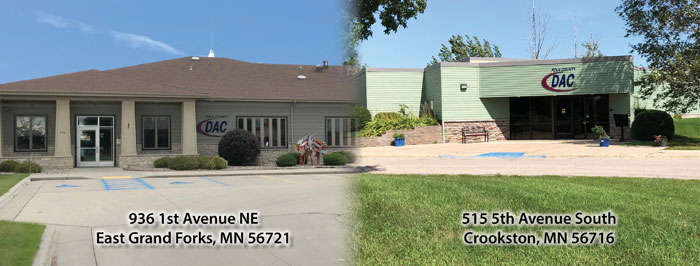
Source for top image: Shutterstock